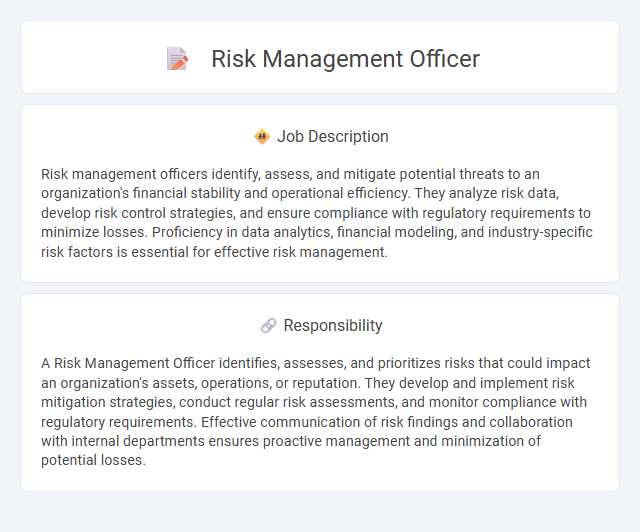
Risk management officers identify, assess, and mitigate potential threats to an organization's financial stability and operational efficiency. They analyze risk data, develop risk control strategies, and ensure compliance with regulatory requirements to minimize losses. Proficiency in data analytics, financial modeling, and industry-specific risk factors is essential for effective risk management.
Individuals with strong analytical skills and attention to detail are likely suitable for a risk management officer role, as this job often involves assessing potential threats and developing mitigation strategies. Candidates who demonstrate resilience under pressure and effective communication abilities may have a higher probability of succeeding in this position. Those lacking critical thinking or organizational skills might find the responsibilities of risk evaluation and compliance challenging.
Qualification
A Risk Management Officer typically requires a bachelor's degree in finance, business administration, or a related field, with many employers preferring candidates who hold professional certifications such as Certified Risk Manager (CRM) or Financial Risk Manager (FRM). Strong analytical skills, proficiency in risk assessment tools, and experience with regulatory compliance are essential qualifications. Expertise in data analysis software, excellent communication abilities, and a deep understanding of industry-specific risk factors enhance job performance and career advancement.
Responsibility
A Risk Management Officer identifies, assesses, and prioritizes risks that could impact an organization's assets, operations, or reputation. They develop and implement risk mitigation strategies, conduct regular risk assessments, and monitor compliance with regulatory requirements. Effective communication of risk findings and collaboration with internal departments ensures proactive management and minimization of potential losses.
Benefit
Risk management officer roles likely offer significant benefits, including enhanced organizational resilience and reduced financial losses through proactive identification and mitigation of risks. Professionals in this position may experience career growth opportunities and increased job security due to their critical role in safeguarding company assets. Effective risk management could also lead to improved stakeholder confidence and compliance with regulatory requirements.
Challenge
Risk management officers likely face the challenge of anticipating and mitigating potential threats in dynamic business environments. They probably need to analyze complex data and regulatory changes to develop effective risk strategies. Balancing proactive risk identification with organizational goals may pose ongoing difficulties.
Career Advancement
Risk management officers advance their careers by developing expertise in identifying, assessing, and mitigating organizational risks across industries such as finance, healthcare, and insurance. Pursuing certifications like Certified Risk Manager (CRM) or Financial Risk Manager (FRM) enhances credibility and opens pathways to senior roles such as Chief Risk Officer (CRO) or Risk Director. Gaining proficiency in regulatory compliance, data analysis, and strategic planning significantly increases promotion prospects within corporate risk management hierarchies.
 kuljobs.com
kuljobs.com